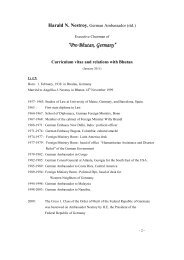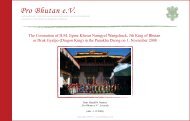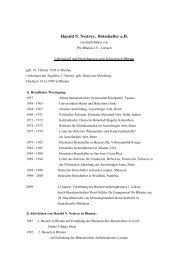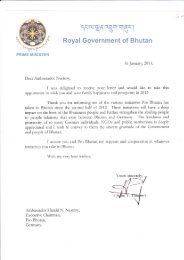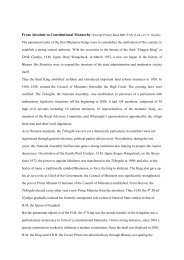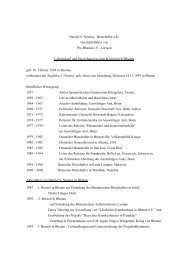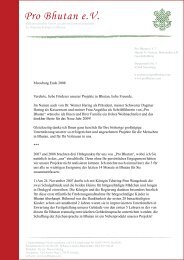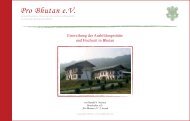“Bhutan , the Himalayan Buddhist Kingdom ... - Pro Bhutan eV
“Bhutan , the Himalayan Buddhist Kingdom ... - Pro Bhutan eV
“Bhutan , the Himalayan Buddhist Kingdom ... - Pro Bhutan eV
Create successful ePaper yourself
Turn your PDF publications into a flip-book with our unique Google optimized e-Paper software.
philanthropischer Verein zur aktiven Entwicklungshilfe<br />
im Himalaja Königreich <strong>Bhutan</strong><br />
institutions on village level are strongly pursued. They take actively part in <strong>the</strong><br />
preparation and execution of <strong>the</strong> “Five Years Plans” for <strong>the</strong> entire scope of<br />
Government work.<br />
Although <strong>the</strong> Tshogdu is not yet a parliament in <strong>the</strong> Western sense, as is does not<br />
derive from general elections and as <strong>the</strong>re are, as yet, no political parties which<br />
would compete for <strong>the</strong> votes, today this National Assembly has become an institution<br />
quite strong: upon initiative of <strong>the</strong> 4. King, Jigme Singye Wangchuck, (in office since<br />
1972) , <strong>the</strong> power to appoint <strong>the</strong> Ministers and, to <strong>the</strong> horror of many<br />
tradition-minded <strong>Bhutan</strong>ese, to force <strong>the</strong> king to abdicate in favour of his heir was<br />
transferred to <strong>the</strong> Tschogdu in 1998. The King gave up his de facto role as Chief of<br />
<strong>the</strong> Government; <strong>the</strong> Council of Ministers was significantly streng<strong>the</strong>ned; <strong>the</strong> post of<br />
Prime Minister (Chairman of <strong>the</strong> Council of Ministers) established: by rotation<br />
every year ano<strong>the</strong>r minister is elected by <strong>the</strong> Tshogdu. The Druk Gyalpo has<br />
gradually reduced his formerly omnipotent role to that of a head of state similar to<br />
that of H.M. <strong>the</strong> Queen of England. On <strong>the</strong> King’s order, <strong>the</strong> elaboration of a modern<br />
written constitution has been initiated and is now fairly advanced.<br />
A number of <strong>Bhutan</strong>ese are worried that <strong>the</strong> speed with which <strong>the</strong> King is pressing<br />
for <strong>the</strong>se reforms, is far to fast for a nation which, a mere forty years ago, still has<br />
lived under medieval conditions.<br />
To a very high and visible degree, <strong>Bhutan</strong> is characterized not only by Buddhism but<br />
also by its worldly traditions. It is, in particular, <strong>the</strong> King who is promoting <strong>the</strong><br />
preservation of <strong>Bhutan</strong>ese traditions in all aspects of live. But, of course, he is aware<br />
that <strong>the</strong>re is no alternative to modernisation of his country. Thus in 1999, national TV<br />
was introduced with 3 hours daily emissions, complementing <strong>the</strong> one radio station<br />
with its few hours daily service, and <strong>the</strong> once-weekly news paper, all three being<br />
Government institutions. The fear of foreign influence is still <strong>the</strong> guide line for <strong>the</strong><br />
official media politics. But two years ago a breakthrough came with <strong>the</strong> admission of<br />
international satellite TV- services. Also Internet has become, in recent years, a<br />
normal commodity accessible to everybody.<br />
Allow me now a short philosophical excursion, namely to <strong>the</strong> <strong>Bhutan</strong>ese central<br />
development concept which is unique:<br />
Its principal is <strong>the</strong> maximization of “Gross National Happiness” in contrast to <strong>the</strong><br />
“Gross National <strong>Pro</strong>duct”. This concept was introduced by <strong>the</strong> present King in <strong>the</strong><br />
late 1980s and evolved into <strong>the</strong> accepted label for <strong>the</strong> distinct <strong>Bhutan</strong>ese perception<br />
of <strong>the</strong> fundamental purpose of development: namely to maximize happiness of <strong>the</strong><br />
citizen ra<strong>the</strong>r than maximizing economic growth as such. In short, <strong>the</strong> internationally<br />
adored idol of “Growth of <strong>the</strong> Gross National <strong>Pro</strong>duct” as THE way for development<br />
is reduced to an instrument, although important, but not as an end by itself. This<br />
concept places <strong>the</strong> individual at <strong>the</strong> centre of all development efforts by recognizing<br />
that <strong>the</strong> individual has not only material but equally or more important, spiritual and<br />
emotional needs. Therefore <strong>the</strong> development is not to be defined and measured alone<br />
or mainly by increased consumption of goods and services. The key to happiness is<br />
to be found, after basic material needs have been met with, in <strong>the</strong> satisfaction of<br />
non-material needs and in emotional and spiritual growth. The <strong>Bhutan</strong>ese concept<br />
rejects <strong>the</strong> notion that <strong>the</strong>re is a direct and unambiguous relationship between wealth



